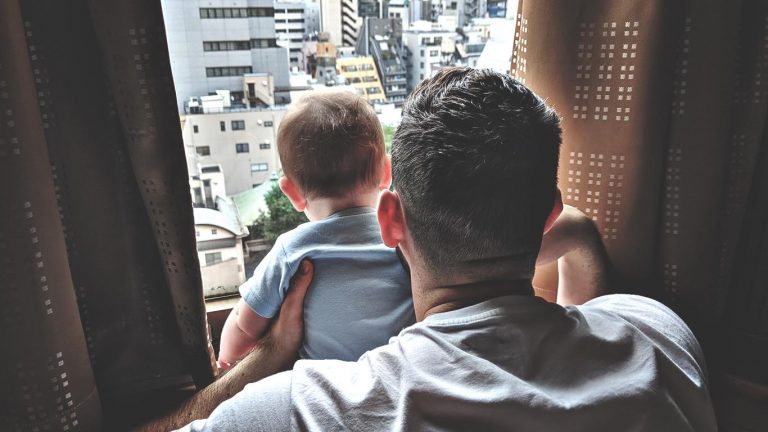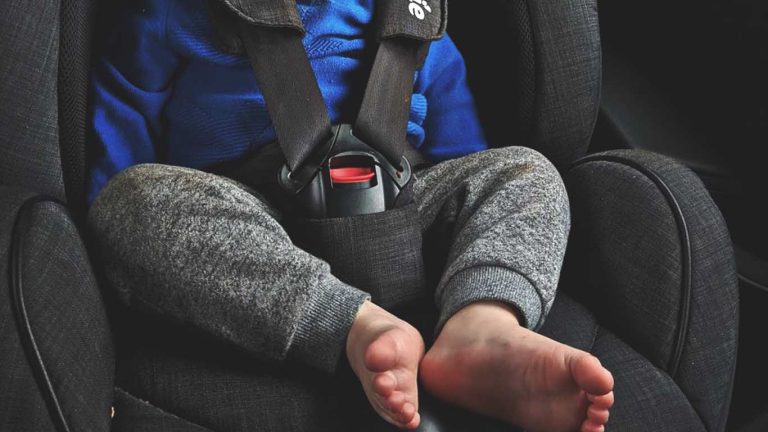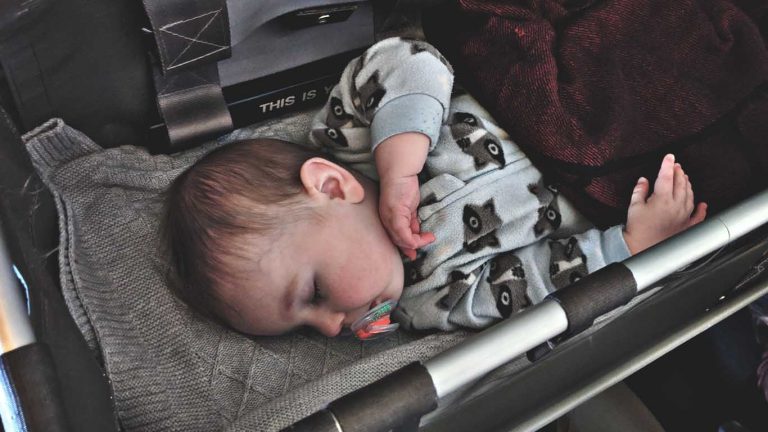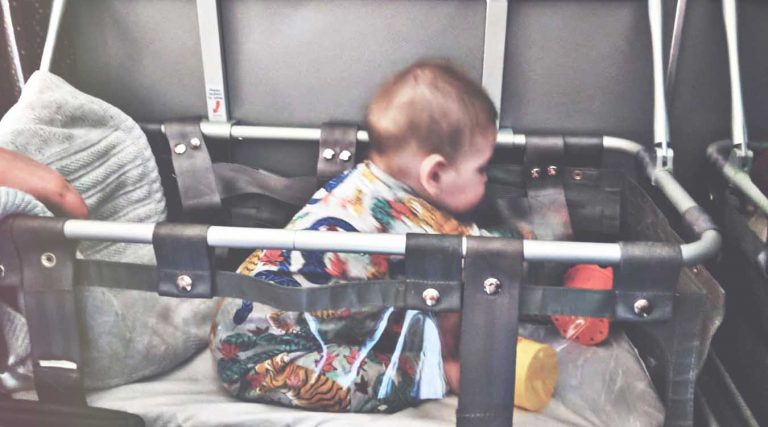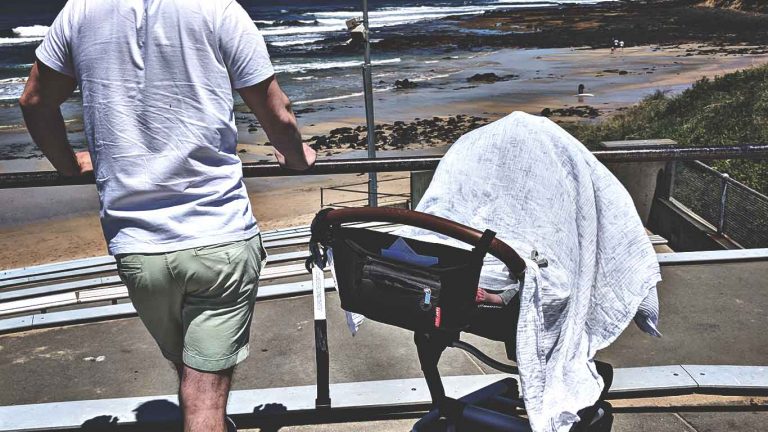There are few things as exciting as taking your family away on vacation. Just one problem – if you’re traveling long distance, you may find your family facing the dreaded jet lag.
Jet lag is hard enough to handle as an adult. With babies you have even more challenges.
Here’s how you can tackle jet lag with babies and toddlers and make travelling with your kids more enjoyable for everyone.
1. Choose flights with minimal disruption
Before you do anything else, you need to book your flights. Pay close attention to the time of your flights as this could seriously impact how your baby or child fares when it comes to jet lag. Ideally, you want to be looking for flights that take place overnight and have the minimal amount of layovers.
The flight should be a chance to rest and reset – for both you and your children. When you book an overnight trip, you should try to get your kids down during the course of the flight. That way, they should be rested on arrival at your destination.
On long haul flights, ensuring that your little ones have a large period of rest and sleep is essential. You can help to aid this process by creating a distraction-free zone where they can relax and drift off to sleep.
However, if you can’t book an overnight flight, the next best alternative is one during the day. You can then go straight to your accomodation from the airport. This means the whole family gets to rest up. Check out our guide for more tips on flying with babies.
2. Consider how much recovery time they (and you) need
Once you’ve landed, you might want to start your family-fun vacay right away… but wait a minute. You absolutely need to make sure that your family and little ones have some recovery time.
Be aware that the recovery time may differ depending on the age of your child. Amy Maidenberg, M.D., board-certified pediatrician at Sage Pediatrics explaines that newborns up to the age of two months may not experience it at all.
“Babies who are “newborn to 2 months have not yet established a diurnal cycle, so jet lag will probably not impact them,”
However, as babies start to sleep through the night, jet lag may start to become a big problem. Older children and toddlers may find that their bodies respond in a similar way to adults, but they may also have less motivation to try to get ‘in sync’ with the local time zone.
Regardless of how your baby or child is affected, it’s important to remember that you allow at least a day for recovery. Try not to plan any major activities on the first day of your break. Instead, dedicate that time to allowing everyone to get some rest.
3. Prepare yourselves before the trip
What you do in the lead-up to the vacation could make all the difference. Make sure the little ones get lots of sleep in the days leading up to the big flight.It should go without saying that you need to help your little ones relax before the vacation so that they are as fresh as can be.
You may also want to consider slightly adjusting your kids’ sleeping routine to help make the transition a little easier than it would otherwise be.
For example, if you’re headed on a short trip that will take you to a different timezone, you may wish to start adjusting yourself and your children ahead of time.
If the timezone is four hours ahead, you could allow your child to stay up a little later than usual (and – hopefully – wake up a little later too!).
In the week leading up to the event, you could push your child’s bedtime back by fifteen minutes per day. By the end of the week, their bedtime will be closer to the timezone of the place you’re headed. Note: This will not work for long trips!
4. Keep as hydrated as possible
Being in the air for a long period of time can make you and the family dehydrated, according to information from Harvard Health.
This curious side effect of travel can contribute to the feeling of jet lag – causing headaches, tiredness, and other complaints. Needless to say, it’s something that you want to avoid at all costs.
The answer is simple – drink some water! It’s crucial that you and your family drink as much water as possible when you’re trying to recover from jet lag. Both while you’re on the plane and after you’ve landed, you need to make this one of your top priorities.
Should you have a young baby, you also need to consider your feeding schedule. Rather than trying to stick rigidly to the routine that you already have in place, try a ‘feed on demand’ approach.
If you are breast feeding, shorter and more frequent feeds can help keep baby hydrated- but don’t forget to keep mama hydrated too!
5. Start adjusting to local time, before you leave
Sure, it may be tempting to hit the hay when you land – regardless of what time it is – but that’s no way to combat jet lag. You and your little ones need to adjust to the local time as soon as possible. Reset your watch (your phone will do this automatically!) and start basing your routine on the local timezone.
Research from the American Institute of Physics suggests that the direction of your flight will have an impact on how easy this transition is. After undertaking eastward flights, passengers reported a slower recovery time than those who undertook westward flights.
Don’t be too hard on yourself or your children if it takes some time to assimilate to local time. It won’t be easy but it will be worth it when you get it right.
6. Keep your routines as consistent as possible
While you’re likely going to have to make some changes to the time of your routine, you should make sure that the things you do are as consistent as possible. You probably already know the routine and structure that benefits your toddler or baby most.
When it comes to basic things like your feeding and bedtime rituals, you should keep them much the same as they are at home. So, if you bathe your toddler 20 minutes before you put them down to sleep, you will need to do the same while you’re on vacation.
While you are away from home, try to make everything feel as natural and familiar as possible for your kids.
7. Take extra care if breastfeeding
If you’re still breastfeeding your child, you might find that your routine is disrupted. Chances are your milk supply wont automatically adjust to fit the new time zone . Experts from RaisingChildren.net explain that some mothers experience a dip in milk production as a direct result of jet lag.
If you are concerned about this being a problem, make sure that you have some alternative feeding options with you. Taking some formula or expressed milk could mean that you have a backup plan if you find that you are low on milk supplies.
Be sure to stay hydrated, get the rest that you need, avoid extra stress and worry, and continue to breastfeed as much as possible. These small and simple tips should help regulate your body’s natural creation of milk.
8. Be ready for nightly wake-ups
Unfortunately Nightly wake-ups are not unusual among jet-lagged children, especially around meal times.
Children may wake up when their meal times come around is because their bodies have been conditioned to expect food at this time. Avoid letting them eat at this time. If we cave and let them eat, they will probably wake again the next night… and then the next night again.
Instead, you need to keep the environment as quiet and peaceful as possible. Make sure that the room in which they’re sleeping is as dark as possible. Take away anything that could stimulate and wake them up, i.e. games, tablets, or anything that makes a sound.
9. Consider your return trip
When the trip is over, you might think that all the trouble is too. Wrong! The truth of the matter is that you also have to consider how jet lag will affect your children when you return home.
As we’ve mentioned before, if you’re traveling eastward on your journey, you may find that the effects of the time change may be more severe than they otherwise would be. It’s worth looking into which way you’ll be traveling ahead of time.
Set aside a day on returning home so that your little ones can reset. Try your best to keep your baby or toddler on local time; arranging mealtimes and bedtime around this point.
However, you will have to allow for some disruptions here. You may find that your child needs to nap briefly or that they are tired throughout the day.
Be soft on them when it comes to this issue. They need a little time to readjust and get back into the swing of things.
Remember, this too shall pass… eventually.
Baby jet lag and sleep training
If you’re already in the midst of sleep training your baby and attempting to establish a solid bedtime routine, you may want to use it as part of your jet lag defence. However, experts at Safe Sleep Space think otherwise:
“We don’t recommend sleep training for this at all, rather we suggest you go with the flow for about a week to 10 days, and see what is needed then. Some babies bounce back after just a couple days, and some, like some adults, take a little longer”
Rather than relying on your sleep training technique to combat jet lag, they explain that you can use daylight to help reset the day/night clock and supporting your baby by providing as many sleep opportunities as possible.
It could be an idea to take a break from your regular sleep training routine as it may interfere with the main objective here – getting your baby the rest they need.
How jet lag affects toddlers and babies
As your kid’s bodies are adjusting to the new local time, according to MedicineNet.com you might find that you child experiences some of the following symptoms:
- Exhaustion/tiredness
- Sleeplessness and trouble resting
- Poor sleep quality
- Dizziness
- Sweating
- Indigestion
- Nausea
- Confusion/memory loss
- Difficulty concentrating
Luckily jet lag doesn’t last forever, and after a few days our body clocks will adjust to the new timezone.
Think we’ve missed something important? Have a top tip to help overcome baby or toddler jet lag? Let us know in the comment section below! We always love hearing from our readers.

